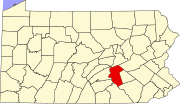Edgemont, Pennsylvania
Edgemont, Pennsylvania | |
|---|---|
Unincorporated community | |
| Motto(s): "Edgemont is a place called home where the community comes from humble beginnings" | |
 Edgemont | |
| Coordinates: 40°17′6″N 76°50′56″W / 40.28500°N 76.84889°WCoordinates: 40°17′6″N 76°50′56″W / 40.28500°N 76.84889°W | |
| Country | United States |
| State | Pennsylvania |
| County | Dauphin |
| Township | Susquehanna |
| Elevation | 486 ft (148 m) |
| Time zone | UTC-5 (Eastern (EST)) |
| • Summer (DST) | UTC-4 (EDT) |
| Area code(s) | 717 and 223 |
Edgemont is an unincorporated community in Susquehanna Township, Dauphin County, Pennsylvania in the Harrisburg-Carlisle Metropolitan Statistical Area, nearby bordering the state capital city of Harrisburg, Pennsylvania northeast, and the nearby census-designated place of Progress, Pennsylvania, the latitude is 40.285, and the longitude −76.849, its elevation is 486 feet.
History[]
The The Edgemont Realty Company, owned by Col. J.C. Morrow and Arthur Young, sold lots between Locust Lane and Brook Avenue at public auction in 1906 for as little as $15. In 1917, the two-room Glenwood Schoolhouse was built to serve grades 1-6.[1] Following the demolition of Harrisburg's Old Eight Ward by the 1920s, many of the Ward's black residents first relocated to Edgemont.[2] By this time, the area was still mostly undeveloped farms and woodlands. The Edgemont Volunteer Fire Company was first organized as a bucket brigade in 1920, the oldest in the Township. In 1936, after beginning a career teaching at the Glenwood School, Anna L. Carter undertook the challenge of organizing philanthropic clubs and after school programs, and would eventually become principal and namesake for a local elementary school. The streets went unpaved until the 1950s, and a full sewer and water project was completed by the early 1970s.[1]
References[]
- ^ a b History and Comment on Susquehanna Township: Celebrating 50 years as a First Class Township. 2002.
- ^ author., Beers, Paul B. (2011). City contented, city discontented : a history of modern Harrisburg. ISBN 978-0-9839571-0-2. OCLC 761221337.
{{cite book}}:|last=has generic name (help)
External links[]
- Harrisburg–Carlisle metropolitan statistical area
- Unincorporated communities in Dauphin County, Pennsylvania
- Unincorporated communities in Pennsylvania

